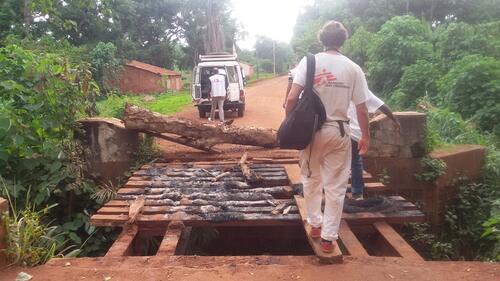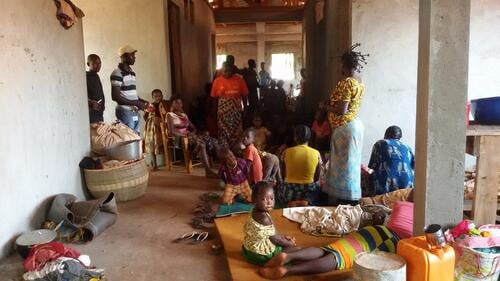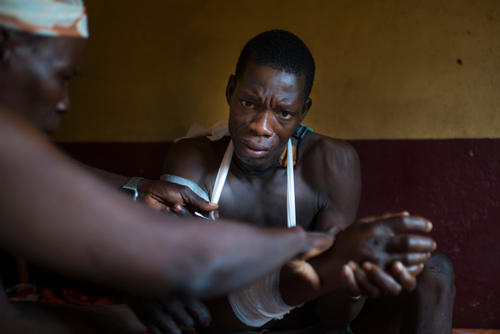Testimony by René Colgo, deputy head of mission presently coordinating the MSF emergency response in Bangassou.
We had known for weeks that they were getting closer… We were told they were 60 kilometres away. Then, two weeks ago, as we were on our weekly visit to the health centre of Yongofongo, some 25 kilometres from Bangassou, Central African Republic, we came across people fleeing the village. They told us that an armed group had taken over the village, killing three civilians in the market. A fourth person who tried to flee was caught and murdered. And then there was the incident last Monday between the same armed group and the UN forces (MINUSCA) that left five UN soldiers dead and 10 wounded, as well as a dozen wounded from the armed group and an unknown number of deaths.
So when the shooting started in Bangassou on Saturday morning around 3am, I cannot say I was surprised. We were ready to treat the wounded; we had put in place a contingency plan at the hospital. We had set up a tent with 18 extra beds to accommodate the wounded. But how do you prepare for the panic and chaos? For that feeling of hopelessness that comes over you when you know that there are people out there that need your help, but who you cannot reach without putting your own life at risk? When you know so many lives are at risk? How to prepare for the fatigue that grips you as a result of the constant strain? I’m not sure these are things you can ever be prepared for.
Everything happened very quickly. When gunshots started in the Tokoyo neighbourhood, the Muslim area of town, people scattered in all directions, running into the night to find shelter where they could – at a friend’s place, in the church, in the mosque, in the grounds of the hospital… a tide of people, and then nothing. The city remained empty for two days. Only armed men ventured into the streets. Not a sound except for gunfire.
At the hospital we received 22 wounded on Saturday, and four more on Sunday morning. And then some 500 people trickled in and settled in the yard, in the corridors, hoping that the fighters would refrain from attacking a medical structure. They are scared. Some are thoroughly traumatized, such as a woman in her thirties, who came in a state of shock with her husband from the Toyoko neighbourhood – her eyes still full of the violence she had witnessed: neighbours being mowed down by gunfire or machetes, houses being looted or set on fire. Our psycho-social team offered immediate support and she eventually managed to recover a little. She’s now waiting with her family in the yard of the hospital to see what will happen next. We live in the present moment, ready to react. We are the only organisation in Bangassou that is able to provide emergency medical care.

As we speak, we are especially concerned by the fate of those men, women and children who sought refuge in the mosque in Tokoyo. We are assisting people who have sheltered in the hospital, and the Catholic mission is helping those who are in the church, but those who are now in the mosque are completely cut off.
For two days they have had no access to water or food, while the temperatures rise up to 30 degrees. Among them there are wounded people as well as the bodies of people who were brutally murdered on Saturday morning. On Sunday evening, the bishop of Bangassou managed to escort a few women and children from the mosque to the church, and a few others, traumatized or wounded, to the hospital.
We finally reached the mosque on Monday where we were able to provide some emergency health care. Out of 25 wounded patients, we treated 10; five needed surgery. But then the gunfire went off again all around us and we had to flee, leaving 250 refugees behind in the mosque.
The city of Bangassou is unrecognisable; armed men are shooting guns everywhere, helicopters are flying over our heads. We fear the worst if effective long-term measures are not put into place to ensure the protection of civilians.





